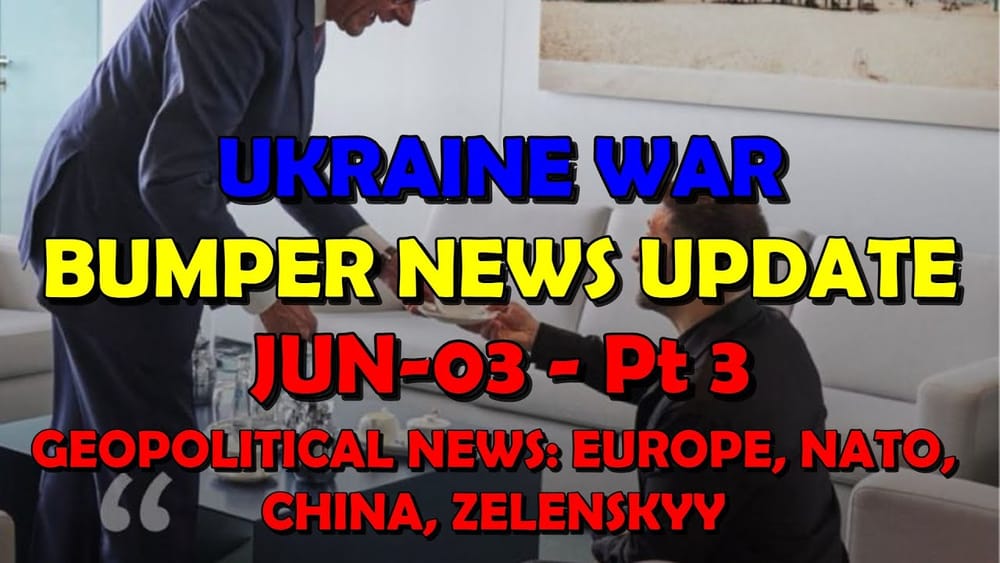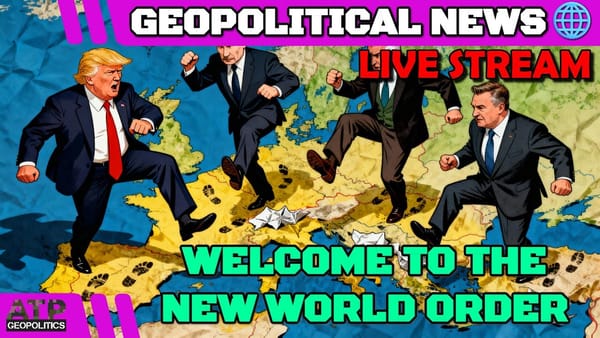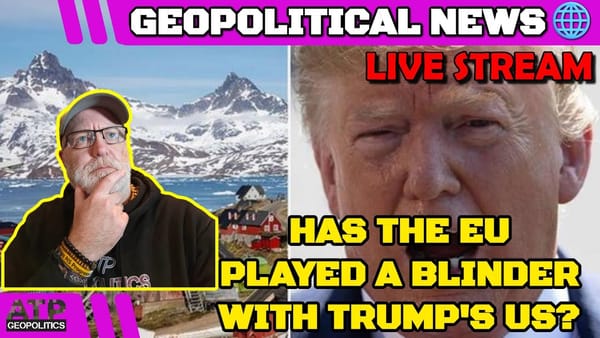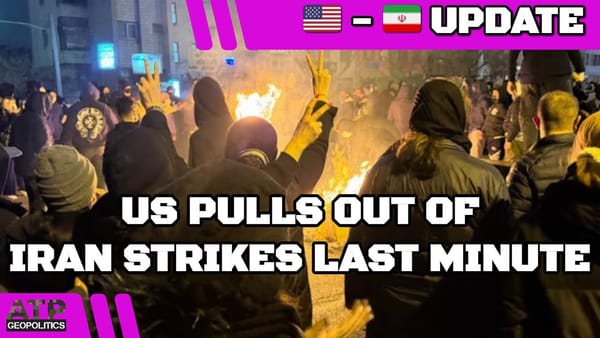Ukraine War Update BUMPER NEWS: Geopolitical News
Table of Contents 📖
Hello Team
🎦 00:00-00:33⏩
Jonathan welcomes viewers to another ATP Geopolitics video, focusing on geopolitical news. He acknowledges the recent intensity of breaking news regarding the Dutch government collapse, Kerch Bridge attacks, and airbase strikes, which have overshadowed important background developments in the Ukraine war.
Return to top⤴️
OPEC+ extends oil output surge despite Russian pushback
🎦 00:33-02:30⏩
OPEC+ is continuing to increase oil output by 411,000 barrels per day in July, marking the third consecutive monthly increase. Jonathan explains that this decision is a major strategic move that will likely cause crude oil prices to reach a four-year low. This hurts Russia, as their oil extraction costs are relatively high, and they need revenue to fund the war. OPEC+ is proceeding with this despite Russian pushback, indicating a concerted effort to manipulate prices for their benefit, potentially also impacting the US fracking sector.
Return to top⤴️
NATO and Russia conduct simultaneous Baltic Sea drills
🎦 02:30-02:58⏩
NATO's annual "BALTOPS" exercise is scheduled for early June, as usual. Russia has, however, brought forward its own naval drills by a month, deploying approximately 20 warships simultaneously in the Baltic Sea. Jonathan notes the seriousness of these concurrent "war games" and the inherent risks of incidents.
Return to top⤴️
Sweden tightens control over Russia's shadow fleet in Baltic Sea
🎦 02:58-04:02⏩
From July 1st, the Swedish Coast Guard and Maritime Administration will gain access to insurance data for all vessels in Swedish waters, not just those docking in ports. This allows them to verify insurance details and potentially stop ships lacking proper documentation before they reach port. Jonathan sees this as excellent news for tightening regulations on Russia's shadow fleet, which might force Russian ships to take alternative routes or face scrutiny.
Return to top⤴️
Swedish music competition secretly channels fees to sanctioned Russian bank
🎦 04:04-05:20⏩
A Swedish media investigation has revealed that a prestigious music competition in Stockholm has been secretly funnelling entry fees to a sanctioned Russian bank. Furthermore, the competition employed jury members from institutions that support Russia's war in Ukraine. Jonathan notes this discovery adds to anecdotal evidence of implicit support for Russia in some Swedish circles, though he acknowledges Sweden, along with Norway, Finland, and Denmark, has generally been very supportive of Ukraine.
Return to top⤴️
German Chancellor Merz to meet Trump in Washington
🎦 05:21-06:02⏩
German Chancellor Merz is scheduled to meet former President Trump in Washington, D.C. Jonathan anticipates this will be a crucial meeting, questioning how Merz will navigate discussions on Ukraine and potentially deal with any "White House ambush" regarding the German far-right party, AFD.
Return to top⤴️
EU Diplomat Kaja Kallas on US criticism and European defence spending
🎦 06:04-09:46⏩
Kaja Kallas, Europe's top diplomat, welcomed recent US criticism of European defence spending as a sign of continued American engagement. During defence talks in Singapore, Pete Hegseth cited Europe's increased military spending as a benchmark, urging Asian allies to match these efforts against the rising threat from China. Jonathan highlights the irony of Europe now being criticised for not spending enough, just months after facing criticism for the opposite. He also points out that while the US pushing Europe to 'own more of its own security' might seem beneficial, it also diminishes US influence and arms sales in Europe. Kallas acknowledged existing divisions within Europe on defence spending, stating that some nations realised the necessity of investment long ago.
Return to top⤴️
Trump Advisor Keith Kellogg claims NATO is waging a proxy war against Russia
🎦 09:46-13:12⏩
Jonathan discusses former Trump advisor Keith Kellogg's recent statement on Fox News, where Kellogg claims NATO is waging a proxy war against Russia. Jonathan clarifies his own nuanced definition of 'proxy war' – that Ukraine is fighting with extensive NATO support (money, weapons, training, intel, economic, information, and cyber war) – versus Putin's pejorative framing, which implies NATO forced Ukraine into war. Jonathan criticises Kellogg for "regurgitating Russian talking points" without the necessary qualification, which allows Russia to deflect blame for its invasion onto NATO. He stresses the importance of precision in language, particularly when discussing such sensitive topics, to avoid validating Russian disinformation.
Return to top⤴️
Mike Pompeo: US will not abandon Ukraine
🎦 13:12-14:04⏩
Former US Secretary of State Mike Pompeo, speaking at the Black Sea Security Forum in Odesa, stated that "Ukraine is not a pawn that can be sacrificed" and that the US "will not abandon Ukraine" in its fight against Russia. He emphasised that Ukraine is merely one of Putin's goals and that Putin "won't stop there." Pompeo also acknowledged that the US did not do enough to stop the war in 2014. Jonathan welcomes Pompeo's broadly supportive remarks but questions if they are mere "empty words," with the true commitment resting on Congressional actions rather than the Trump administration's stance.
Return to top⤴️
Trump to retain US command role in NATO Europe
🎦 14:07-17:04⏩
Reuters reports that Trump intends to retain the US role in NATO command in Europe, specifically appointing an American general as NATO commander. Jonathan links this to his earlier analysis: the more the US distances itself from Europe and encourages European independence, the less influence it will have over strategic decisions. While Trump previously considered withdrawing troops and relinquishing this command role, he now seems to realise that true isolationism would mean losing significant say in NATO affairs. Jonathan argues that if the US wants Europeans to contribute more (pay more, provide more capability), it must also be prepared to do less and therefore command less. The UK's Keir Starmer welcomed Trump's commitment as a positive sign that Washington is not completely withdrawing from European security.
Return to top⤴️
Hungary and Slovakia knowingly remain dependent on Russian energy
🎦 17:04-17:34⏩
A new study reveals that Hungary and Slovakia have knowingly remained dependent on Russian energy, including gas and nuclear supply. The report found that both countries ignored viable options to reduce their reliance on Russian hydrocarbons. Jonathan stresses this is a significant issue as it keeps them within Russia's sphere of influence and likely involves "quid pro quo" arrangements, undermining broader European efforts to wean off Russian energy.
Return to top⤴️
Gazprom natural gas sales to EU decline by 93% since Feb 2022
🎦 17:36-19:25⏩
Jonathan presents a chart illustrating the significant decline in Gazprom's natural gas sales to the EU. Sales are now down 93% from February 2022 levels. While sales saw a slight increase in mid-2023, a concerted effort and a formal EU plan to reduce reliance on hydrocarbons have driven them to the lowest levels yet in 2025. Jonathan acknowledges that Europe still buys Russian energy, but the trend clearly shows a substantial reduction compared to the start of the full-scale invasion, despite the continued dependence of countries like Hungary and Slovakia.
Return to top⤴️
Declining Polish sympathy for Ukrainians: Wolyn massacre, economic competition, and Russian influence
🎦 19:25-28:43⏩
Jonathan discusses the concerning decline in Polish sympathy for Ukrainians. In 2023, 51% of Poles sympathised, dropping to 40% in 2024, and further to 30% in 2025, with 38% now not sympathising. This shift is attributed to:
- Russian bots and Polish right-wing influence: Spreading misinformation.
- The Wolyn massacre: Awareness of this divisive historical event (1943) has jumped from 20-30% in 2022 to 80% in 2025, reigniting historical grievances despite Zelensky's efforts to address the issue.
- Economic competition: Poles, for the first time, are experiencing competition for jobs from Ukrainian refugees (many of whom are educated middle-class professionals), mirroring the UK's past experience with Polish migrant workers. This has led to resentment over job and housing costs.
- Social prejudice: There's a perceived "looking down" on Ukrainians, leading to frustration when they succeed economically, unlike migrants from Western Europe.
- Myths: Propaganda is fueling myths about Ukrainian men entering illegally and Ukrainian women "stealing" Polish men, alongside general xenophobia.
Jonathan draws parallels to the UK's Brexit-era sentiments towards Eastern European immigrants, highlighting how such societal shifts are exploited by Russian propaganda and influence. He expresses concern over the recent Polish presidential election, where votes from far-right, pro-Russia, anti-Ukraine candidates may have influenced the outcome.
Return to top⤴️
Zelensky meets with NATO SG, Polish President Duda, and Finnish PM Orpo
🎦 28:45-32:07⏩
President Zelensky has been meeting with key leaders in Vilnius, part of the B9 nations (Eastern European countries formed to counter Russian influence). He met with:
- NATO Secretary General Mark Rutte: Thanking the alliance for strong support, discussing prisoner exchanges, child returns from Istanbul talks, and Russia's refusal of an unconditional ceasefire. They also discussed diplomatic steps, defence aid, and boosting Ukraine's long-range capabilities. Jonathan observes the warmth in these interactions, noting that other leaders genuinely like and empathise with Zelensky, embodying support for Ukraine.
- Polish President Andrzej Duda: Despite some "issues around the fringes," the PiS party (Duda's party) remains a firm supporter of Ukraine. They discussed bilateral relations, diplomatic efforts, and maintaining pressure on Russia for a just peace, along with mutually beneficial economic projects. Jonathan expresses concern about the new Polish president, Navrotsky, who might be more beholden to the far-right's pro-Russia/anti-Ukraine views.
- Finnish Prime Minister Petteri Orpo: Their discussion focused on investing in Ukrainian weapons production and co-manufacturing, including scaling up Ukraine's effective drone line project.
Ukraine's NATO path declared irreversible
🎦 32:08-32:36⏩
A key agreement from the Vilnius summit declared Ukraine's path to NATO as "irreversible." This directly contradicts Russia's long-standing demand for a written guarantee to halt NATO's eastward expansion, which the Trump administration has echoed as a condition for ending the war.
Return to top⤴️
US and EU coordinate new sanctions package against Russia
🎦 32:36-33:41⏩
Following a visit to Kyiv by US Senators Lindsey Graham (Republican) and Richard Blumenthal (Democrat), the US has begun coordinating a new sanctions package against Russia with the EU. Jonathan explains that the senators travelled via Europe to ensure European alignment with a proposed Congressional Bill to support Ukraine and impose harsh tariffs and sanctions on Russia. Zelensky welcomed this coordination as a "very good sign," underscoring that hope for robust action currently rests with the US Congress, rather than the Trump administration directly.
Return to top⤴️
Macron on North Korean soldiers in Ukraine and China's responsibility
🎦 33:46-34:33⏩
French President Emmanuel Macron highlighted the significant issue of North Korean soldiers in Ukraine, stating it's not being discussed enough. He issued a clear message to China: if Beijing does not want NATO involved in Southeast Asian affairs, it "must prevent North Korea from interfering in European territory." Jonathan applauds Macron's direct approach, suggesting it's a strategic way to leverage China's regional interests to curtail its allies' (and its own) support for Russia.
Return to top⤴️
Countering Russia's narrative on NATO expansion vs. Russian invasion
🎦 34:34-35:44⏩
Jonathan contrasts Russia's complaints about NATO's "eastward expansion" with its own "westward expansion" through military invasion. He praises the satirical "Darth Putin" account for consistently highlighting this hypocrisy: Russia complains about NATO potentially "knocking on the door" of its neighbours, while simultaneously invading a country to its west. Jonathan strongly criticises figures like Keith Kellogg for echoing Russian talking points about a "proxy war" and NATO expansion without carefully qualifying such statements, thus playing into Russia's narrative and absolving them of responsibility for their invasion of Ukraine.
Return to top⤴️
EU identifies Sino-Russian alliance as global challenge, cites China's dual-use goods for Russia
🎦 35:44-36:19⏩
The EU views the Sino-Russian alliance as the world's biggest challenge, with leaders stressing the need to defend the rules-based international order. Kaja Kallas specifically warned that 80% of dual-use goods aiding Russia's war in Ukraine originate from China. Jonathan, noting Macron's recent statements, suggests the EU may be strategising a more formal approach to counter China's assistance to Russia.
Return to top⤴️
UK Defence Review identifies Russia as urgent threat, China as difficult challenge
🎦 36:19-37:25⏩
The UK's Strategic Defence Review identifies Russia as an "imminent and urgent threat" to UK security. Jonathan praises this recognition and the overall "sensible document," despite needing funds for implementation. China, however, is described not as an enemy, but as a "difficult challenge" ready to cooperate with Moscow. Jonathan interprets this nuanced wording as a pragmatic approach to avoid overtly alienating China, which might push it further into Russia's embrace. The goal is to encourage China to cease aiding Russia, rather than intensifying confrontation.
Return to top⤴️
Jonathan's commentary on Russia's future and China's current actions
🎦 37:29-38:07⏩
Jonathan offers his perspective on Russia's future, asserting that the current dictatorship and its mode of operation "can't carry on for the good of the Russian people." He believes Russia needs to "disintegrate, dissolve, and be remade," not through external regime change, but from within. He hopes China would help facilitate this, but notes that China appears to be increasing its support for Russia, possibly influenced by the US's perceived disengagement from Ukraine.
Return to top⤴️
North Korea and Iran labelled as 'regional disruptors'
🎦 38:09-38:19⏩
In the UK's Defence Review, North Korea and Iran are categorised as "regional disruptors," a term Jonathan finds amusingly vague.
Return to top⤴️
UK Defence Intelligence and RUSI insights on Russia's threat and NATO's preparedness
🎦 38:22-42:50⏩
Jonathan shares insights from a Bloomberg article by Mark Champion, detailing a meeting of generals and officers from 20 countries at the UK's Royal United Services Institute (RUSI). Key takeaways include:
- Imminent Threat: Military leaders are not asking if Russia will attack a NATO member, but where, when, and how.
- Adaptation: While initially surprised by Russia's ineptitude in 2022, NATO leaders no longer hold such complacency. Russia has rapidly adapted its tactics, especially with drones and electronic warfare, where it is now "probably ahead of NATO."
- Casualty Indifference: Western generals are sobered by Russia's "near-total indifference to casualty rates." This makes wargaming difficult, as Western strategists cannot project their own value systems onto Russia, giving Putin a strategic latitude NATO lacks.
- Logistical Challenges: If Article 5 were invoked, getting forces from Western Europe to the Eastern Front would be hampered by a "spider's web of bottlenecks," national transit license requirements, and inadequate infrastructure. NATO has been working on these logistical issues, but it remains a significant challenge, unlike Ukraine's protected supply lines through Western countries.
New German Chancellor Merz shows strong support for Ukraine
🎦 42:50-44:56⏩
Jonathan discusses former UK Defence Secretary Ben Wallace's view that German Chancellor Olaf Scholz "consistently played along with Putin," whereas the new Chancellor Merz "wants to change that." Jonathan agrees that Merz has hit the ground running with stronger rhetoric and positioning. Ukrainian Ambassador to Germany, Alexei Makyev, also observed a "new tone" and "trusting and sympathetic atmosphere" between Zelensky and Merz, even noting a video of Merz making Zelensky a cup of coffee. Jonathan emphasises that these small gestures, like hugs and personal interactions, are "really important indicators" and "give you a window into the bigger things," revealing a genuine willingness to work together and provide help.
Return to top⤴️
US law firm paid millions by Kremlin insiders to bypass sanctions
🎦 44:56-47:16⏩
Jonathan shares details from a Kyiv Post investigation, originally reported by Katie Livingston, revealing that an American law firm, Rathmel Short, LLP, was paid nearly $3 million by two senior leaders of Russia's state-owned military industrial conglomerate Rostec (both sanctioned) to help them navigate and potentially bypass US sanctions. While technically legal under a loophole allowing sanctioned individuals to seek legal help for delisting requests, Jonathan highlights this as "definitely questionable." The firm was also allowed to coordinate with a lobbying firm to support desanctioning efforts, demonstrating how "Kremlin's most connected figures still find backdoors into American systems of law and influence," undermining the effectiveness of sanctions.
Return to top⤴️
Moldova denies entry to 200 Russian passengers
🎦 47:16-47:37⏩
Moldova recently denied entry to 200 Russian passengers at Chisinau airport, leading to heated incidents. Jonathan notes that he's unaware of the full backstory but hopes Moldova is increasingly "standing up to Russia."
Return to top⤴️
Russia expands military presence in Southern Libya
🎦 47:37-49:45⏩
Jonathan highlights a report from Agenzia Nova, cited by GeoInsider, detailing Russia's rapid expansion of its military presence in Southern Libya. Plans are advancing to establish a significant base in Sebha, a strategic location just 1,000 kilometres from Europe's coast. Belarus is also playing an intermediary role between Russia and Libyan National Army Leader General Khalifa Haftar. The build-up includes the deployment of TOR air defence systems and at least 2,000 personnel, including mercenaries and advisors, across approximately 10 established Russian military bases in eastern Libya. Jonathan expresses shock at this development, contrasting it with the ongoing focus on NATO's "eastward expansion" while Russia actively expands its influence on Europe's southern doorstep.
Return to top⤴️
Smuggled North Korean phone exposes extreme state surveillance and censorship
🎦 49:52-52:05⏩
Jonathan shares a BBC report on a smuggled North Korean phone, revealing the regime's extreme surveillance and censorship measures. The phone automatically auto-corrects "dodgy" Korean terms to approved words (e.g., "oppa" to "comrade," "South Korea" to "puppet state"). Critically, the phone secretly screenshots the screen every five minutes, saving these images to a hidden folder accessible only by authorities, allowing them to monitor user activity. Jonathan finds this "absolutely fascinating" but also "frightening," drawing a parallel to technologies like Peter Thiel's Palantir, which seeks to compile data on everyone and has contracts with entities like the NHS in the UK.
Return to top⤴️
British Politics: Reform UK's pro-Russia stance vs. Keir Starmer's unwavering support for Ukraine
🎦 52:05-56:46⏩
Jonathan expresses disappointment with Reform UK, accusing them of "fake patriotism" and a pro-Russian foreign policy. He recounts his interview with "The News Agents," where he discussed how patriotism shouldn't be about "flags and jingoistic stuff" but about genuinely helping people. He views Reform UK's approach as a "veneer-thin form of patriotism." He highlights a stark contrast with Keir Starmer, who explicitly stated: "I know where I stand on Ukraine. I stand with Ukraine against the aggressor, which is Russia. Farage and his party have got a pro-Russian foreign policy. You couldn't have a starker distinction between us." Jonathan felt Starmer displayed "visceral anger" when making this point. Furthermore, Jonathan points out that not a single Reform UK MP attended the Strategic Defence Review Statement in Parliament, which identifies global threats and defence strategies. In contrast, Conservative MPs were proudly wearing UK and Ukrainian flag lapel pins. Jonathan criticises Reform UK for their apparent lack of seriousness about national security and their tendency to "appease" Russia until public sentiment turns against it. He concludes that Nigel Farage is "Donald Trump in British form" and is "naturally a friend of Russia," not Ukraine, citing Farage's past appearances on Russia Today as evidence.
Return to top⤴️
Wrap up
🎦 56:47-56:58⏩
Jonathan concludes the video, acknowledging its length due to the volume of important geopolitical news. He hopes the update has been worthwhile for viewers, stressing that "a lot is happening in the world."
Return to top⤴️
🤖❓ AI Debrief (post task) - anything the AI didn't understand
0123456789




